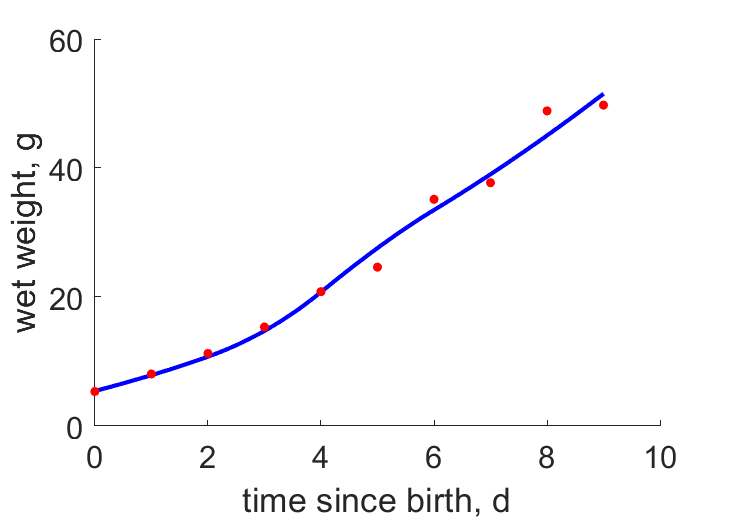Predictions & Data for this entry
| Model: std | climate: Cfa, Dfa, Dfb | migrate: Ms | phylum: |
| COMPLETE = 2.5 | ecozone: THn | food: biCi, biHs | class: |
| MRE = 0.022 | habitat: 0iTh, 0iTi, 0iTs | gender: Dg | order: |
| SMSE = 0.001 | embryo: Tnpf | reprod: O | family: |
Zero-variate data
| Data | Observed | Predicted | (RE) | Unit | Description | Reference |
|---|---|---|---|---|---|---|
| ab | 13.5 | 13.85 | (0.02567) | d | age at birth | avibase |
| tx | 15 | 14.98 | (0.001473) | d | time since birth at fledging | avibase |
| tp | 45 | 44.42 | (0.01287) | d | time since birth at puberty | guess |
| tR | 365 | 365 | ( 0) | d | time since birth at 1st brood | guess |
| am | 8432 | 8448 | (0.001926) | d | life span | avibase |
| Ww0 | 6.8 | 7.319 | (0.07635) | g | intitial wet weight | avibase |
| Wwb | 5.57 | 5.393 | (0.03182) | g | wet weight at birth | avibase |
| Wwi | 92.6 | 92.92 | (0.00348) | g | ultimate wet weight | avibase |
| Wwim | 119.6 | 120 | (0.003616) | g | ultimate wet weight for males | avibase |
| Ri | 0.0137 | 0.01366 | (0.00289) | #/d | maximum reprod rate | avibase |
Uni- and bivariate data
| Data | Figure | Independent variable | Dependent variable | (RE) | Reference |
|---|---|---|---|---|---|
| tW |  | time since birth | wet weight | (0.05044) | PeerBoll1997 |
Pseudo-data at Tref = 20°C
| Data | Generalised animal | Quiscalus quiscula | Unit | Description |
|---|---|---|---|---|
| v | 0.02 | 0.04675 | cm/d | energy conductance |
| p_M | 18 | 672.4 | J/d.cm^3 | vol-spec som maint |
| k_J | 0.002 | 0.02738 | 1/d | maturity maint rate coefficient |
| k | 0.3 | 0.2979 | - | maintenance ratio |
| kap | 0.8 | 0.9695 | - | allocation fraction to soma |
| kap_G | 0.8 | 0.8007 | - | growth efficiency |
| kap_R | 0.95 | 0.95 | - | reproduction efficiency |
Discussion
- Males are assumed to differ from females by {p_Am} only
- mod_1: Pseudo-data point k is used, rather than k_J; Data set tp and parameter t_R are added, the latter replacing clutch interval t_N. Postnatal T is based on PrinPres1991, see get_T_Aves. See further the revision page, theme puberty
Bibliography